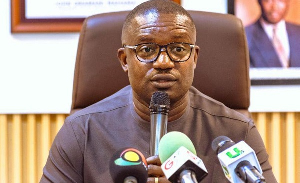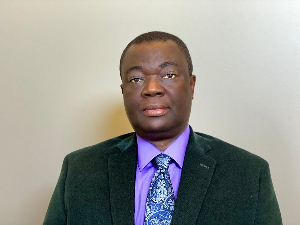NPP Petition: Countdown to Judgement Day (Part V)
By Dr. Michael J.K. Bokor
Sunday, August 25, 2013
ITEM 5: Factors that don’t favour the petitioners
The fundamental flaw of the NPP’s petition lies in its nature, form, scope, and intents and purposes. The petition is seriously flawed because of its wrong premise. In every reasonable challenge of the outcome of general elections, the petitioners ask for a recounting of votes, especially in places where they felt cheated as a result of rigging or other malpractices that turned the elections against them.
In the almighty United States, it happened in the State of Florida at the 2000 general elections that helped George Bush clinch victory when Al Gore halted any further challenge. In the recent case in Kenya, the challenger (Raila Odinga) asked for a recount of votes, but lost the appeal eventually.
Why not also in the case of the NPP of Ghana? The petitioners took the wrong direction to concentrate on pink sheets instead of ballot papers to be recounted, even if anything at all, at the polling stations in the NDC’s strongholds that formed the basis for their challenge. They didn’t turn that way toward a recounting of votes. So, what could they expect? And do they think that their holding of God hostage will be the answer to their fundamentally flawed petition and request for Akufo-Addo to be declared Ghana’s President?
We already know the difficulties surrounding the framing of the petition to reflect anything substantial that the respondents might not be able to defend. The petitioners skirted around and fished deep in the course of evidence presentation but came up empty-handed in the long run.
All their huffing and puffing couldn’t push Dr. Afari Gyan to the wall for him to yield anything incontrovertible to boost their allegations. His admission of irregularities concerning non-signing of pink sheets by Presiding Officers is nothing consequential to the cause of the petitioners. So also are issues surrounding serial numbers and biometric verification.
There was no acceptable definition for “over-voting” and at the end of the cross-examination of Dr. Afari Gyan by Philip Addison (counsel for the petitioners), it became clear that no voter in Ghana voted more than the legally binding “one voter one vote”. Had anybody been exposed as voting more than once, the petitioners might have a good point to stand on. They couldn’t even prove that anybody voted outside Ghana despite their hoarse and ugly shouts concerning the 241,000 prospective voters that they accused the EC of registering overseas!!
The petitioners made much fuss for nothing about over-voting and couldn’t adduce any concrete evidence from any polling station to that effect. After all, their star witness, Dr. Mahamudu Bawumia, had made it clear with his “You and I were not there” cacophony. Neither could his claim that “For my analysis, I only used the duplicated/triplicated data only once”.
In the end, the Court couldn’t even know the exact quantum of pink sheets that the petitioners framed their case around. That was why Addison was asked again on the last day of sitting to come clean.
The respondents punched holes in Dr. Bawumia’s testimony, creating serious doubts about his credibility and portraying the so-called “water-tight” evidence as nothing but the product of desperation.
Thus, if the petitioners and their followers are posturing in public and thumping their chest in anticipation of victory at the Supreme Court as reported, they will only be over-speeding toward the political quagmire awaiting them.
The mirage that they have been chasing all along is at the edge of that quagmire, waiting to suck them in.
They will be disappointed in the end because the parameters that the Court set itself don't call for declaring Akufo-Addo the winner. Those parameters portray more of the need to sustain the status quo ante than shifting the paradigm in favour of those who lost the elections but are now using technicalities to enter political office through the back-door.
A careful analysis of the two areas defined by the Supreme Court shows that the judges are only interested in whether the irregularities that the petitioners are complaining about did occur. And we all saw from the proceedings that some irregularities (non-signing of pink sheets by Presiding Officers, for instance) occurred. But as Dr. Afari Gyan insisted, only 990 out of the 26,002 pink sheets were affected. More importantly, though, all the polling agents signed all the pink sheets. Additionally, other pieces on the pink sheets that validated the elections were side-stepped by the petitioners!!
Thus, the judges will in the end determine whether the so-called "irregularities" were substantial enough to cause them to go to the extreme of overturning the results.
So far, we don’t dispute the fact that there were some irregularities (as is to be expected of human institutions that are not sacrosanct—because we human beings are not infallible). Those irregularities aren’t substantial enough to warrant any overturning of the outcome of Election 2012—a painful fact that the Supreme Court will reveal on August 29 to the utter dismay and unjustifiable anger among the petitioners and their followers.
Looked at from a wider angle, it is clear that the petitioners have hamstrung themselves with their being selective in choosing the areas on which to base their case. By going for only pink sheets in the NDC's strongholds, they have made it difficult for a bird's eye view to be taken of the elections in terms of all the 26,002 polling stations. So, the judges are constrained and can't use their skewed pink sheet exhibits as the basis for annulling over 4 million votes or for declaring the entire elections as improperly run for which they must declare Akufo-Addo outright as the winner. What will be the legal basis for such an unusual determination? None exists!!
Again, the Supreme Court will be constrained in ruling for a re-run. As is obvious already, the petitioners don't trust the EC. Who then will conduct the re-run? Again, should it involve all the 26,002 polling stations or only those identified by the petitioners as where the irregularities occurred? What will be the justification for the Supreme Court's acquiescence in this sense when pink sheets were not gathered from Akufo-Addo's strongholds to make the exhibits representative of the global picture concerning Election 2012?
More importantly—as I have already identified and expressed elsewhere—retaining the status quo will be the lesser evil than disregarding reality to empower Akufo-Addo. The peace that everyone is calling for cannot be assured otherwise. Of course, the NPP camp may want to indulge in riotous conduct when declared losers but they can be contained when the full force of the state security apparatus is brought down to bear heavily on them.
The problem that any verdict in favour of the NPP will cause cannot be solved because it will be the bursting of an avalanche of genuine protests against the wrong decision by the Supreme Court. I am being brazen here to say that the evidence on the ground doesn’t present this petition as winnable. It will, therefore, go against the grain for the Supreme Court to fail to retain the status quo.
Addison himself had a hindsight benefit to acknowledge that no such petition has ever succeeded in Africa apparently because it hasn’t passed the test of reality, as expressed by this member of the Kenyan Supreme Court that dismissed the suit brought by Raila Odinga against the Kenyan President-elect (Kenyatta) and the Electoral Commission:
“If you want to win an election, win it at the ballot box. Do not come to court. Why should 14 million Kenyans be put through that problem (registration and voting), then you want six or seven people to decide. Who are we?”
Furthermore, Akufo-Addo himself made it clear that it is votes that count at elections: “Elections are about those who cast votes, not those who count, not those who supervise, not those who transmit and not those who declare. It is the casting of the ballot that is sacred, God-given right of a citizen casting his or her ballot. The rest of the activities are at best, administrative duties”—Nana Akuffo-Addo (Dec. 28, 2012).
So, what is there for the petitioners to claw at except the straw that they have mistaken for substance?
The long duration taken by the hearing itself should send alarming signals to the petitioners that they will lose the case. Clearly, eight months after being declared winner of Election 2012 and installed in office according to constitutional provisions, President Mahama has already consolidated his hold on power. It will not be easy divesting him of that power; and the Supreme Court’s taking so long to conclude this case is a clear manifestation that what is written is written.
There are too many more contentious issues that don’t favour the petitioners. They know that they are wobbling and hobbling toward a more severe disgraceful moment; but are as usual holding themselves out in public, engaging in useless deeds of derring-do and daring everybody to take them on. In the end, Fate will seal their doom.
We will leave them to stew in their own self-fulfilling prophecies and laugh their hearts out for now. But they will come to the painful realization on August 29 that all along, they've been laughing at the wrong side of their mouths.
I shall return…
• E-mail: mjbokor@yahoo.com
• Join me on Facebook at: http://www.facebook.com/mjkbokor
• Contact me through http://mjkbokor.wordpress.com/2013/08/19/writers-relief/ for solutions to your writing problems.
Opinions of Friday, 30 August 2013
Columnist: Bokor, Michael J. K.














